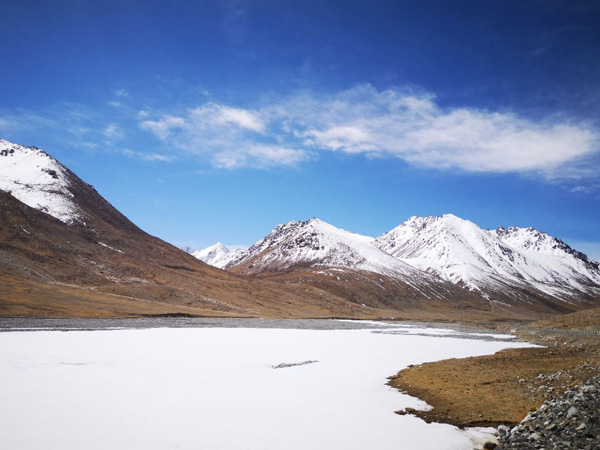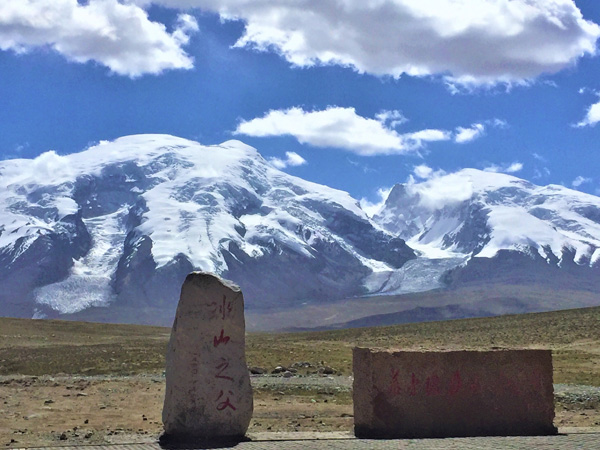The snow on the top of
Muztagh Ata peak is like white hair and the inversion of glaciers is like silver whiskers fluttered in front of the chest. Muztagh Ata is like a gray longevity man, standing in the mountains, so it has the laudatory title of “father” of the iceberg.
For many years, there are the cults, there are adventurous climbers come here, and therefore some mountaineering organizations at home and abroad come as an endless stream. The more mysterious the place is, the more attractive it is. The highway of Muztagh Ata pass through the foot of the mountain, the domestic and international climbers arrive with necessary things, such as a bicycle, a small tent, a small bag and then rushed to Muztagh Ata camped out below the mountain.
Summer and fall, many little colorful gorgeous tents like a blooming flower, dress up
the Gobi Desert, Snow Mountain and grass and make them look enchanting. While more and more people come here as devout pilgrims and enjoy Muztagh Ata peak and
Karla Kurer Lake form a delightful contrast, or gather contained deeply in Muztagh Ata of deep cultural background.
Information
Muztagh Ata is a round shaped block mountain peak; the main peak is 7509 meters above sea level, with the high terrain, the climate is cold. In all year aroung, the rain is mainly solid precipitation; therefore it is very conducive to develop glacier.
Around its main development on both sides of many larger mountain glaciers, it is radiated distribution pattern. above the top of the mountain there has been covered a height of 5100, 5500 meter in an area of hundreds of square kilometers of ice mountain that is 7000 meters above the sea level, and become a special valley type of overflow valley glaciers. There are 128 modern glaciers, with an total glacier area of 377.21 square kilometers, and eight glaciers of which are more than 10 square kilometers, and the largest glacier is located on the east side of the main peak of Kirk glaciers, and the area is 86.5 square kilometers, and it is one of the important glaciations area of Tarim Basin.
Geography
The west of mountain peaks is flat, but north and east is very steep. This mountain is round, looks like steamed bread, snow spread all year around, snow line is about 5200 meters above sea level. The iceberg landscape develop more than ten glaciers, the biggest Qili Glacier and Kematule Glacier cut the mountain in half, and the end of glacier reach an altitude of 4300 meters. The top of mountain is 100-200 meters thick, and the mountain is regarded as the “father of the glaciers”. In uygur: “Muz” has the meaning of ice, “tag” for the mountains, and the meaning of “Ata” is father, therefore “Muztag Ata” means the “father of the iceberg”. There are mainly four ridges: south ridges, west ridge, northeast ridge, and northwest ridge. West slope is flat, but has many cracks; North Slope and east slope are very steep.
Environment
Peaks of the east Pamirs is located in the inland, and there are many mountains cut off the Indian Ocean, the Pacific airflow come into inland, therefore the climate is very dry. At an altitude of 7500 meters, the average temperature in below20
℃, even in summer, the mountain can also be snow. Here is a dry climate, keeping a perennial climate between 25 and 30 degrees Celsius below zero. So the mountaineering activities are usually arranged in June to August.
How to Get There
The highway from Muztagh Ata passes through the foot of the mountain, from
Kashgar to the Khunjerab it pass via Muztagh Ata peak. There is about 200 km distance from highway to stronghold of mountain, so tourists need to charter a car to go there. The climate here is similar to the Kongur Tagh. Because there are many mountains cut off the airflow from the Indian Ocean, the Pacific to go into, the climate is very dry, and the rainfalls mainly come from high altitude airflow, polar westerlies airflow and interactions of cold and wet airflow. At an altitude of 7500 meters, the average temperature in the 20 degrees, the minimum temperature can reach 30 degrees, the maximum wind grade is 9 to 11, and usually wind is in the magnitude 7. The frequent change of the weather is a feature in this area, even in summer, the mountain may also snow, and the temperature can drop to 20 degrees below zero.


